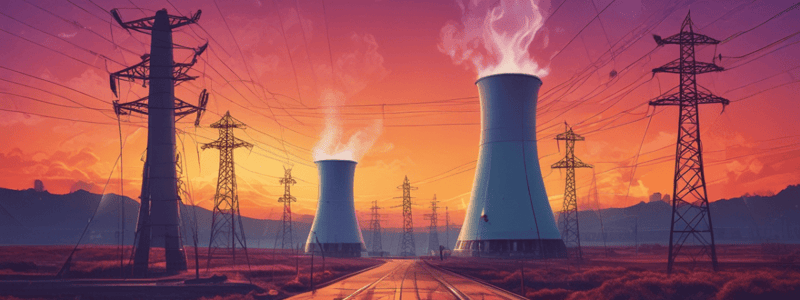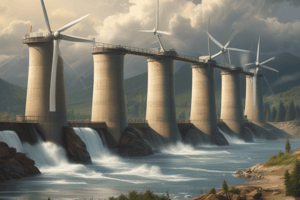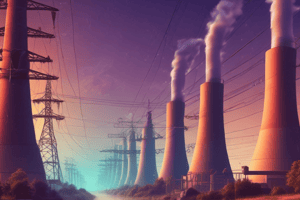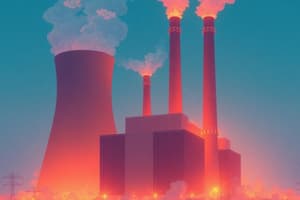Podcast
Questions and Answers
What is the primary function of water in a hydroelectric power plant?
What is the primary function of water in a hydroelectric power plant?
- To cool the generators
- To produce steam for electricity generation
- To turn turbines to generate electricity (correct)
- To lubricate the machinery
What is a major advantage of wind power?
What is a major advantage of wind power?
- High operational costs
- Constant wind speeds
- High initial investments
- Low emissions during operation (correct)
What is the process by which solar power generates electricity?
What is the process by which solar power generates electricity?
- Using mirrors to focus sunlight onto a turbine
- Converting sunlight directly into electricity (correct)
- Burning fossil fuels to produce electricity
- Converting sunlight into thermal energy
What is geothermal energy used for?
What is geothermal energy used for?
What is the primary usage of portable generators?
What is the primary usage of portable generators?
What is a common advantage of alternative energy sources?
What is a common advantage of alternative energy sources?
What is the mechanism by which portable generators typically operate?
What is the mechanism by which portable generators typically operate?
What is biomass energy used for?
What is biomass energy used for?
What is the primary function of a turbine in a power station?
What is the primary function of a turbine in a power station?
What is the purpose of pulverization in a coal-powered power station?
What is the purpose of pulverization in a coal-powered power station?
What is the environmental impact of relying on coal as an energy source?
What is the environmental impact of relying on coal as an energy source?
What is the definition of alternative energy?
What is the definition of alternative energy?
What is the purpose of a generator in a power station?
What is the purpose of a generator in a power station?
What is the final step in the process of generating electricity in a coal-powered power station?
What is the final step in the process of generating electricity in a coal-powered power station?
What is the definition of a power station?
What is the definition of a power station?
What is the type of energy source that coal is classified as?
What is the type of energy source that coal is classified as?
Wat is die hoofdoel van elektrisiteitgenerering?
Wat is die hoofdoel van elektrisiteitgenerering?
Watter toestel konvertueer meganiese energie in elektrisiteit?
Watter toestel konvertueer meganiese energie in elektrisiteit?
Wat is die hoofbron van energie in Suid-Afrika vir elektrisiteitgenerering?
Wat is die hoofbron van energie in Suid-Afrika vir elektrisiteitgenerering?
Watter stap in die proses van elektrisiteitgenerering in 'n kool-aangedrewe kragstasie veroorsaak die verbranding van kool?
Watter stap in die proses van elektrisiteitgenerering in 'n kool-aangedrewe kragstasie veroorsaak die verbranding van kool?
Watter is die finale stap in die proses van elektrisiteitgenerering in 'n kool-aangedrewe kragstasie?
Watter is die finale stap in die proses van elektrisiteitgenerering in 'n kool-aangedrewe kragstasie?
Wat is die rede hoekom kool beskou word as 'n nie-hernubare energiebron?
Wat is die rede hoekom kool beskou word as 'n nie-hernubare energiebron?
Watter stap in die proses van elektrisiteitgenerering veroorsaak die spinning van die turbine?
Watter stap in die proses van elektrisiteitgenerering veroorsaak die spinning van die turbine?
Watter energiebron word Alternatiewe Energie genoem?
Watter energiebron word Alternatiewe Energie genoem?
Watter is die hoofgevolg van die afhanklikheid van kool as energiebron?
Watter is die hoofgevolg van die afhanklikheid van kool as energiebron?
Watter is die doel van die turbine in 'n kool-aangedrewe kragstasie?
Watter is die doel van die turbine in 'n kool-aangedrewe kragstasie?
Wat is die hoofvoordeel van hidroëlektriese krag?
Wat is die hoofvoordeel van hidroëlektriese krag?
Waar word windkrag hoofsaaklik gebruik?
Waar word windkrag hoofsaaklik gebruik?
Waarom is sonkrag 'n geldige alternatief vir fossiele brandstowwe?
Waarom is sonkrag 'n geldige alternatief vir fossiele brandstowwe?
Wat is die primêre voordeel van 'n portuurlike generator?
Wat is die primêre voordeel van 'n portuurlike generator?
Waarom is geotermiese energie 'n belangrike bron van hernubare energie?
Waarom is geotermiese energie 'n belangrike bron van hernubare energie?
Waar word hidroëlektriese krag gebruik om elektrisiteit te genereer?
Waar word hidroëlektriese krag gebruik om elektrisiteit te genereer?
Wat is die hoofvoorwerp van 'n biomassa-energiebron?
Wat is die hoofvoorwerp van 'n biomassa-energiebron?
Wat is die hoofdoel van 'n alternatiewe energiebron?
Wat is die hoofdoel van 'n alternatiewe energiebron?
Waarom is hidroëlektriese krag 'n belangrike bron van hernubare energie?
Waarom is hidroëlektriese krag 'n belangrike bron van hernubare energie?
Wat is die hoofdoel van 'n portuurlike generator tydens kragonderbrekings?
Wat is die hoofdoel van 'n portuurlike generator tydens kragonderbrekings?
Study Notes
Electricity Generation
Introduction
- Electricity generation is a process that takes place in power stations, involving the conversion of different forms of energy into electrical energy.
- In South Africa, coal is predominantly used for electricity generation, but alternative energy sources are also utilized.
Key Terms
- Turbine: a machine for producing continuous power from various energy sources
- Generator: a device that converts mechanical energy into electrical energy
- Alternative Energy: sources of energy that are not derived from fossil fuels
- Power Station: a facility for the generation of electrical power
Steps in a Coal-Powered Power Station
- Pulverization: crushing large chunks of coal into a fine powder
- Combustion: burning the pulverized coal in a furnace
- Steam Generation: boiling water to generate steam using the heat from burning coal
- Turbine Operation: the steam pushing the blades of a turbine, causing it to spin
- Electricity Generation: the turbine spinning the generator to produce electricity
- Transmission: sending the generated electricity through power lines to homes and businesses
Environmental Impact
- Coal is a non-renewable energy source, formed over millions of years from prehistoric vegetation
- The reliance on coal contributes to environmental pollution, greenhouse gas emissions, and climate change, and also leads to habitat destruction and health issues due to air pollution
Alternative Energy Sources
Hydroelectric Power
- Process: using the potential energy of stored water to generate electricity
- Function: water flowing through turbines, turning them to generate electricity
- Example: Gariep Dam, South Africa
- Advantages: renewable, less pollution, and sustainable
Wind Power
- Process: wind turning the blades of wind turbines, connected to a generator
- Advantages: renewable, low operational costs, and no emissions during operation
- Challenges: variable wind speeds and aesthetic concerns
Solar Power
- Process: photovoltaic cells converting sunlight directly into electricity
- Advantages: abundant, renewable, and no emissions
- Challenges: intermittent energy supply and high initial costs
Other Renewable Sources
- Geothermal Energy: using heat from the Earth's interior to generate electricity
- Biomass Energy: converting organic material into electricity through combustion or anaerobic digestion
Generating Electricity with a Simple Generator
- The Faraday Disk, the first electromagnetic generator, is an example of generating electricity with a simple generator
Portable Generators
- Usage: used during power outages to keep essential appliances running
- Mechanism: typically run on fuel such as petrol or diesel
- Types: include small hand-crank generators, dynamos on bicycles, and larger portable units for homes and businesses
Advantages of Alternative Energy Sources
- Renewability: can be replenished naturally
- Sustainability: lower environmental impact compared to fossil fuels
- Diversity: reduces reliance on a single source of energy
Electricity Generation
Introduction
- Electricity generation is a process that takes place in power stations, involving the conversion of different forms of energy into electrical energy.
- In South Africa, coal is predominantly used for electricity generation, but alternative energy sources are also utilized.
Key Terms
- Turbine: a machine for producing continuous power from various energy sources
- Generator: a device that converts mechanical energy into electrical energy
- Alternative Energy: sources of energy that are not derived from fossil fuels
- Power Station: a facility for the generation of electrical power
Steps in a Coal-Powered Power Station
- Pulverization: crushing large chunks of coal into a fine powder
- Combustion: burning the pulverized coal in a furnace
- Steam Generation: boiling water to generate steam using the heat from burning coal
- Turbine Operation: the steam pushing the blades of a turbine, causing it to spin
- Electricity Generation: the turbine spinning the generator to produce electricity
- Transmission: sending the generated electricity through power lines to homes and businesses
Environmental Impact
- Coal is a non-renewable energy source, formed over millions of years from prehistoric vegetation
- The reliance on coal contributes to environmental pollution, greenhouse gas emissions, and climate change, and also leads to habitat destruction and health issues due to air pollution
Alternative Energy Sources
Hydroelectric Power
- Process: using the potential energy of stored water to generate electricity
- Function: water flowing through turbines, turning them to generate electricity
- Example: Gariep Dam, South Africa
- Advantages: renewable, less pollution, and sustainable
Wind Power
- Process: wind turning the blades of wind turbines, connected to a generator
- Advantages: renewable, low operational costs, and no emissions during operation
- Challenges: variable wind speeds and aesthetic concerns
Solar Power
- Process: photovoltaic cells converting sunlight directly into electricity
- Advantages: abundant, renewable, and no emissions
- Challenges: intermittent energy supply and high initial costs
Other Renewable Sources
- Geothermal Energy: using heat from the Earth's interior to generate electricity
- Biomass Energy: converting organic material into electricity through combustion or anaerobic digestion
Generating Electricity with a Simple Generator
- The Faraday Disk, the first electromagnetic generator, is an example of generating electricity with a simple generator
Portable Generators
- Usage: used during power outages to keep essential appliances running
- Mechanism: typically run on fuel such as petrol or diesel
- Types: include small hand-crank generators, dynamos on bicycles, and larger portable units for homes and businesses
Advantages of Alternative Energy Sources
- Renewability: can be replenished naturally
- Sustainability: lower environmental impact compared to fossil fuels
- Diversity: reduces reliance on a single source of energy
Studying That Suits You
Use AI to generate personalized quizzes and flashcards to suit your learning preferences.





